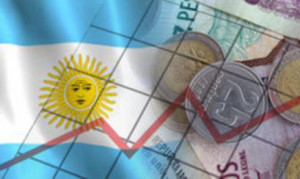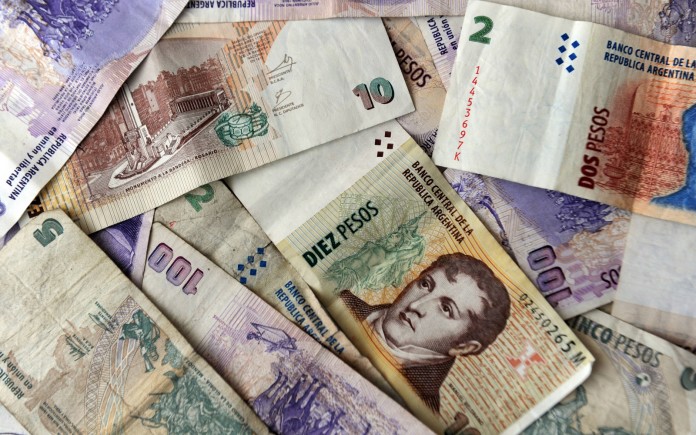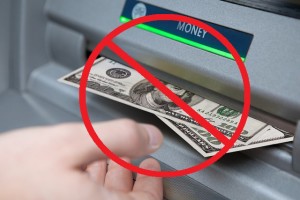One of the trickiest aspects of travelling to a new country is getting your head around how the national currency works. As a foreigner, and student studying abroad in Buenos Aires, you are in a good position coming to Argentina with foreign currency. Take a minute to read this practical overview of how to make the most of your currency during your time in Argentina.
How is the economic situation in Argentina?
The state of the economy in Argentina is unstable and unpredictable. Inflation fluctuates constantly and the Argentine peso seems to lose more value with each passing day.  As one might imagine, it is extremely difficult for those earning in pesos to save and plan for the future. However, the inflation is favorable for anyone traveling to Argentina with foreign currency (particularly US dollars and euros) that’s worth more than the peso. Argentines are eager to purchase these currencies to ensure the value of their savings and to make big purchases, such as buying an apartment.
As one might imagine, it is extremely difficult for those earning in pesos to save and plan for the future. However, the inflation is favorable for anyone traveling to Argentina with foreign currency (particularly US dollars and euros) that’s worth more than the peso. Argentines are eager to purchase these currencies to ensure the value of their savings and to make big purchases, such as buying an apartment.
In Argentina we currently have two different exchange rates: the “official” rate and the “blue” rate. You can find the official rate at the Bank of Argentina website. You can find an approximation of the blue rate on this website.
Is Buenos Aires expensive?
If you are earning in pesos, yes, Buenos Aires is an expensive city to live in. On the other hand, if you are in a strong foreign currency, you will find Buenos Aires to be cheaper (in most cases). Argentina does tax heavily on imported goods, so anything imported will not necessarily be a bargain. Electronics and clothing tend to be more expensive in Argentina while labor and food (laudry service, haircut, groceries, eating out) tend to be significantly cheaper.
Can I take other currencies out of an ATM in Argentina?
N-O. You can only take Argentine pesos from the ATM here. Think of it this way, can you take foreign currency out of the ATM in your country of origin? Nope. Before coming to Argentina, we recommend checking with your bank at home to see what they charge for a withdrawal in a foreign country. We also don’t recommend relying on taking money out of an ATM here. The main reasons is that ATMs will give you the official exchange rate, so you will end up with less pesos than if you are exchanging cash or using an international wire transfer service.
Can I use my foreign debit or credit card in Argentina?
The direct answer to this question is “yes”, but the better question is if you should use your foreign cards in Argentina and the answer is “generally, no”. Although many places now accept cards in Argentina, especially in Buenos Aires, we do not recommend relying on an international debit or credit card during your stay here.
When you use a foreign card they will charge you according to the official rate, the same if you take money out of an ATM here. You can exchange cash at the blue rate, or around it, which means that you are getting a much better deal, sometimes you end up spending twice as much money by paying with a card. However, for smaller purchases like a rideshare app or getting a coffee or a quick lunch, if it’s more convenient for you or you don’t have enough cash on you, you can still use your card.
Can I open a bank account in Argentina?
No. Unless you have a DNI (National Identification Document), an identification showing that you are an Argentine citizen or legal resident, you cannot open a bank account.
How do I exchange money in Buenos Aires?
First of all, it’s important to keep in mind the difference between the “official” and “blue” exchange rates. If you exchange cash at “casas de cambio” (exchange houses) around the city and they offer anything close to the official rate, we recommend going elsewhere because you can always find a better rate than that.
When exchanging money, be sure to bring large bills in good condition (such as $100 USD) as they are preferable to exchange houses. Damaged or older bills are sometimes not accepted. Do not exchange large amounts of money at one time; this is both for safety and inflation reasons. Your money will be worth more as time goes on as the Argentine peso continues to devalue. Be sure to bring your passport as exchange houses and banks require a form of identification to legally perform the exchange. In addition, some places require you to provide the address of where you are staying. After exchanging, head straight to your accommodation and safely store your Argentine pesos. It is not recommended to walk around the city with large amounts of money on your person.
There are many locations to exchange money, however, it is important to go to an exchange house in a secure area that isn’t on a major street. For example, you might see recommendations for the Florida street exchange houses. However, some there are known to scam you by giving you fake bills or less than they should. Contact the Mente Staff if you would like our recommendations.
Should I be worried about counterfeit money?
Counterfeit money can and does happen. Especially when changing with someone you don’t know and trust, it is a good idea to check the bills that you receive. It is common to check bills especially when changing money so don’t worry about being rude. For some helpful tips on how to detect fake money, see this guide.
What if I don’t have cash?
If you don’t want to bring too much USD cash, international money transfer websites are also a good option. The most common company for this service in Argentina is Western Union. Through Western Union you can send money to yourself or a family member or friend of yours can send you money from the US and then you can pick it up here in pesos at a really good exchange rate. They have offices to pick up cash all over the city and many foreigners who live here actually rely on this system.
You can usually pick up the money that same day, just make sure to bring your passport and have the confirmation number and transaction details with you. They will ask who sent you the money and how much it is (in pesos) but you will find all of this information in the confirmation email. It is important to note that with large sums of money (around $1000 USD and up) you may run into some issues and may have to contact your bank for approval.


